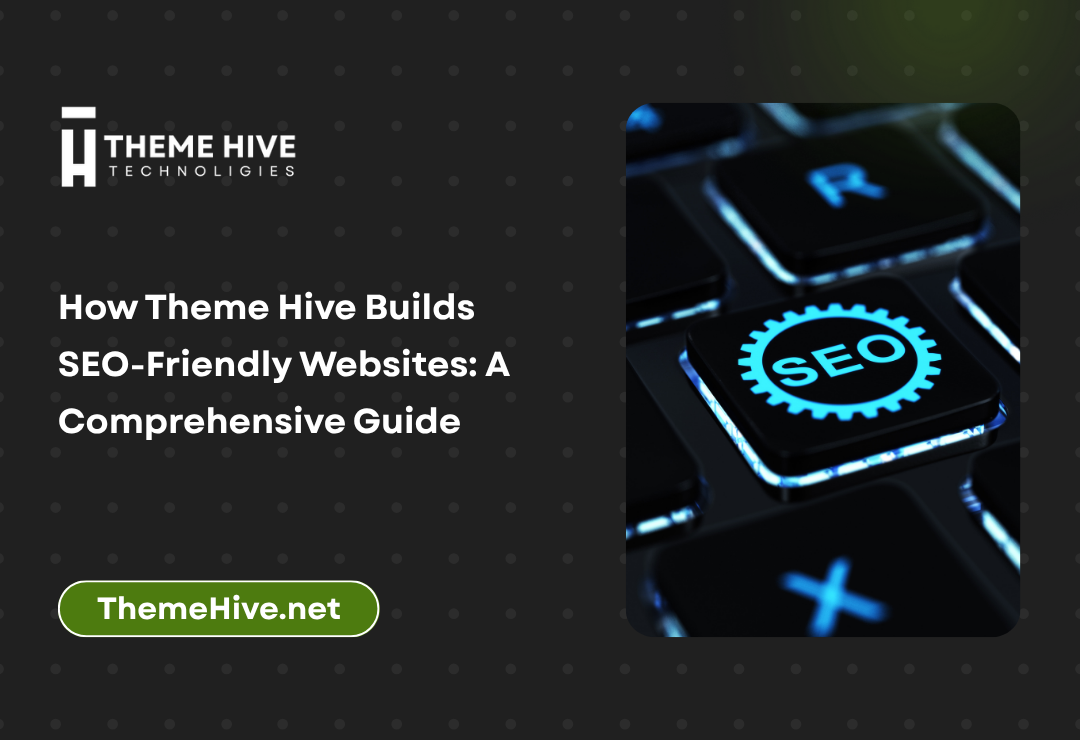In the competitive digital landscape, creating SEO-friendly websites has become essential for businesses seeking online visibility and sustainable growth. Theme Hive Technologies has established itself as a premier provider of search-optimized web solutions that not only rank well in search engines but also deliver exceptional user experiences and drive meaningful business results.
Building effective websites requires a deep understanding of search engine algorithms, user behavior patterns, and technical web development principles. At ThemeHive Technologies, we combine cutting-edge technical expertise with proven SEO strategies to create high-performing websites that consistently outperform competitors and deliver measurable ROI for our clients.
Our approach to developing optimized web solutions goes beyond basic optimization techniques to encompass comprehensive strategies that address every aspect of modern web development, from foundational architecture to advanced performance optimization and user experience enhancement.
Understanding the Foundation of SEO-Friendly Websites
Search-optimized websites are built on a foundation of technical excellence, strategic content optimization, and user-centered design principles that work together to achieve superior search engine rankings and user engagement. Theme Hive Technologies recognizes that modern web solutions must satisfy both search engine algorithms and human users to achieve sustainable success.
The evolution of search engine algorithms has fundamentally changed how we approach building optimized websites. Google’s algorithm updates continuously refine ranking factors, emphasizing the importance of user experience, content quality, and technical performance in web development.
Our team at ThemeHive Technologies stays current with these algorithmic changes, ensuring that every optimized website we develop incorporates the latest best practices and anticipates future algorithm developments.
Core Principles of Theme Hive’s Website Development
Technical SEO Foundation
The technical foundation represents the most critical aspect of optimized web development, encompassing site architecture, code quality, and server performance optimization that directly impacts search engine crawlability and indexing.
Clean Code Architecture: Our search-optimized websites utilize semantic HTML5 markup, properly structured CSS, and optimized JavaScript that enhances both search engine understanding and user experience performance.
Site Structure Optimization: We design websites with logical hierarchical structures that facilitate easy navigation for both users and search engine crawlers, ensuring comprehensive indexing of all important content.
URL Structure Excellence: Optimized websites developed by Theme Hive feature clean, descriptive URLs that incorporate relevant keywords while maintaining readability and logical organization.
XML Sitemap Implementation: Every professionally developed website includes comprehensive XML sitemaps that guide search engines through all important pages and content sections.
Performance Optimization for Search Success
Website performance directly impacts search engine rankings and user experience, making speed optimization a cornerstone of our development process.
Core Web Vitals Optimization: Our optimized websites prioritize Google’s Core Web Vitals metrics, including Largest Contentful Paint (LCP), First Input Delay (FID), and Cumulative Layout Shift (CLS).
Image Optimization Strategies: High-performing websites require comprehensive image optimization including proper compression, modern formats like WebP, and responsive image delivery systems.
Minification and Compression: We implement advanced minification techniques for CSS, JavaScript, and HTML, along with server-side compression to ensure fast-loading websites across all devices.
Content Delivery Network Integration: Strategic CDN implementation ensures optimal performance regardless of user geographic location.
To learn more about our comprehensive approach to website development, visit our services page where we detail our technical capabilities and methodologies.
Mobile-First Design Approach
Modern websites must prioritize mobile experience, as search engines now use mobile-first indexing to evaluate and rank web content.
Responsive Design Excellence: Our optimized websites utilize advanced responsive design techniques that ensure optimal display and functionality across all device types and screen sizes.
Touch-Friendly Navigation: Professional websites developed by Theme Hive incorporate intuitive touch navigation systems that enhance mobile user experience and reduce bounce rates.
Mobile Page Speed Optimization: We specifically optimize websites for mobile performance, recognizing that mobile users have different performance expectations and network constraints.
Progressive Web App Features: Advanced web solutions may incorporate PWA features that enhance mobile user experience through offline functionality and app-like interactions.
Content Strategy Integration in SEO-Friendly Websites
Keyword Research and Implementation
Effective SEO-friendly websites begin with comprehensive keyword research that identifies opportunities for organic visibility and user engagement.
Long-Tail Keyword Targeting: Our SEO-friendly websites incorporate strategic long-tail keyword targeting that captures specific user intent and reduces competition for rankings.
Semantic Search Optimization: Modern SEO-friendly websites must understand and optimize for semantic search principles, incorporating related terms and concepts that demonstrate topical authority.
User Intent Alignment: We develop SEO-friendly websites that align content with specific user intent categories including informational, navigational, commercial, and transactional queries.
Keyword Density Optimization: SEO-friendly websites maintain optimal keyword density that satisfies search engine requirements without compromising content quality or readability.
Content Architecture and Organization
SEO-friendly websites require strategic content organization that supports both user navigation and search engine understanding of site structure and topical relationships.
Topic Clustering Strategies: We implement topic clustering approaches that organize SEO-friendly websites around main topic themes with supporting subtopic content that demonstrates comprehensive coverage.
Internal Linking Optimization: Strategic internal linking within SEO-friendly websites distributes page authority effectively while guiding users through logical content journeys.
Content Hierarchy Development: SEO-friendly websites utilize clear content hierarchies with proper heading structures that improve both accessibility and search engine comprehension.
Schema Markup Implementation: Advanced SEO-friendly websites incorporate comprehensive schema markup that helps search engines understand content context and display rich snippets in search results.
Technical SEO Implementation in Theme Hive’s SEO-Friendly Websites
Server-Side Optimization
The server infrastructure supporting SEO-friendly websites plays a crucial role in search engine rankings and user experience delivery.
Server Response Time Optimization: Our SEO-friendly websites are hosted on optimized server configurations that consistently deliver sub-200ms response times for optimal search engine evaluation.
HTTPS Implementation: All SEO-friendly websites developed by Theme Hive implement SSL/TLS encryption as a standard security and ranking factor requirement.
Server Location Strategy: We strategically select server locations for SEO-friendly websites based on target audience geography to minimize latency and improve local search performance.
Uptime Reliability: SEO-friendly websites require consistent availability, and we ensure 99.9%+ uptime through redundant hosting configurations and proactive monitoring.
Crawlability and Indexation Optimization
SEO-friendly websites must be easily discoverable and indexable by search engine crawlers to achieve optimal rankings.
Robots.txt Optimization: We carefully configure robots.txt files for SEO-friendly websites to guide search engine crawlers while protecting sensitive areas from indexation.
Meta Tag Optimization: SEO-friendly websites feature comprehensive meta tag optimization including title tags, meta descriptions, and specialized tags for social media sharing.
Canonical URL Implementation: Proper canonical URL implementation prevents duplicate content issues that can negatively impact SEO-friendly websites rankings.
404 Error Management: SEO-friendly websites include custom 404 pages and redirect strategies that maintain user experience while preserving search engine equity.
For detailed information about our team’s expertise in technical SEO implementation, visit our about page to learn about our certified specialists and their backgrounds.
Advanced Features in Theme Hive’s SEO-Friendly Websites
Structured Data Integration
Modern SEO-friendly websites leverage structured data markup to enhance search engine understanding and enable rich search result features.
JSON-LD Implementation: Our SEO-friendly websites utilize JSON-LD structured data format recommended by Google for optimal compatibility and performance.
Rich Snippets Optimization: SEO-friendly websites incorporate appropriate schema markup to enable rich snippets for products, reviews, events, and other content types.
Local Business Schema: For location-based businesses, our SEO-friendly websites include comprehensive local business schema markup that enhances local search visibility.
Article and Blog Schema: Content-focused SEO-friendly websites benefit from article schema markup that helps search engines understand publication dates, authors, and content relationships.
Performance Monitoring and Analytics
SEO-friendly websites require ongoing monitoring and optimization to maintain and improve search engine rankings over time.
Core Web Vitals Tracking: We implement comprehensive monitoring systems that track Core Web Vitals performance for SEO-friendly websites and alert to any degradation.
Search Console Integration: All SEO-friendly websites include proper Google Search Console integration for ongoing performance monitoring and issue identification.
Analytics Implementation: SEO-friendly websites feature advanced analytics tracking that provides insights into user behavior, conversion patterns, and SEO performance metrics.
A/B Testing Capabilities: Advanced SEO-friendly websites may include A/B testing frameworks that enable ongoing optimization of conversion elements without impacting SEO performance.
Industry-Specific Approaches to SEO-Friendly Websites
E-commerce SEO-Friendly Websites
E-commerce platforms require specialized SEO approaches that address product catalogs, inventory management, and conversion optimization.
Product Page Optimization: SEO-friendly websites for e-commerce include optimized product pages with unique descriptions, high-quality images, and structured data markup for enhanced search visibility.
Category Page Strategy: We develop category page structures for e-commerce SEO-friendly websites that balance user navigation needs with search engine optimization requirements.
Inventory Management SEO: SEO-friendly websites handling dynamic inventory implement strategies for managing out-of-stock products without creating SEO issues.
Review Integration: E-commerce SEO-friendly websites incorporate customer review systems that generate fresh content and improve search rankings through user-generated content.
Service-Based Business SEO-Friendly Websites
Service businesses require SEO-friendly websites that effectively communicate service offerings while optimizing for local and industry-specific search queries.
Service Page Optimization: SEO-friendly websites for service businesses feature detailed service pages that target specific keywords while providing comprehensive information for potential customers.
Local SEO Integration: Service-based SEO-friendly websites incorporate local SEO strategies including location-specific content, local business listings integration, and geographic targeting.
Case Study and Portfolio Integration: SEO-friendly websites for service businesses benefit from case studies and portfolio sections that demonstrate expertise while generating valuable content for search optimization.
Contact and Conversion Optimization: Service-based SEO-friendly websites prioritize clear contact information and conversion paths that support both user experience and local search requirements.
Content Publishing SEO-Friendly Websites
Content-focused websites require specialized SEO approaches that support high-volume publishing while maintaining search optimization effectiveness.
Publishing Workflow Optimization: SEO-friendly websites for content publishers include streamlined publishing workflows that ensure consistent SEO optimization across all content.
Archive and Category Organization: Content SEO-friendly websites feature logical archive structures that support both user navigation and search engine crawling efficiency.
Related Content Systems: We implement sophisticated related content systems in publishing SEO-friendly websites that improve user engagement while supporting internal linking strategies.
Social Media Integration: Content-focused SEO-friendly websites include comprehensive social media integration that supports content distribution and engagement tracking.
Content Management and SEO-Friendly Websites
WordPress SEO Optimization
WordPress powers a significant percentage of SEO-friendly websites, and Theme Hive Technologies has developed specialized expertise in WordPress SEO optimization.
Theme Development for SEO: Our custom WordPress themes for SEO-friendly websites are built from the ground up with SEO best practices integrated into the core code structure.
Plugin Integration Strategy: SEO-friendly websites on WordPress benefit from carefully selected plugin integrations that enhance SEO capabilities without compromising site performance.
Custom Post Types and Fields: Advanced WordPress SEO-friendly websites may utilize custom post types and fields that support specialized content organization and SEO optimization.
WordPress Security for SEO: We implement comprehensive security measures for WordPress SEO-friendly websites that protect against threats that could negatively impact search rankings.
Content Management Best Practices
Effective content management systems enable ongoing optimization and expansion of SEO-friendly websites without requiring technical expertise.
User-Friendly Interfaces: SEO-friendly websites include intuitive content management interfaces that enable non-technical users to maintain SEO best practices during content updates.
SEO Guidance Integration: We build SEO guidance directly into content management systems for SEO-friendly websites, providing real-time feedback on optimization opportunities.
Content Templates: SEO-friendly websites benefit from content templates that ensure consistent SEO optimization across all new pages and posts.
Media Management: Comprehensive media management systems in SEO-friendly websites support optimal image and video SEO practices.
For the latest insights on SEO trends and website optimization strategies, visit our news and articles section where we regularly publish updates on search engine algorithm changes and optimization techniques.
Quality Assurance and Testing for SEO-Friendly Websites
Pre-Launch SEO Auditing
Every SEO-friendly website developed by Theme Hive undergoes comprehensive pre-launch auditing to ensure optimal search engine performance from day one.
Technical SEO Audit: We conduct thorough technical audits of SEO-friendly websites using tools like Screaming Frog and custom testing protocols to identify and resolve any technical issues.
Performance Testing: SEO-friendly websites undergo extensive performance testing across multiple devices, browsers, and network conditions to ensure consistent user experience.
Content Optimization Review: All content in SEO-friendly websites receives detailed review for keyword optimization, readability, and search engine compliance.
Mobile Responsiveness Testing: Comprehensive mobile testing ensures SEO-friendly websites provide optimal experience across all mobile devices and operating systems.
Ongoing Monitoring and Optimization
SEO-friendly websites require ongoing attention and optimization to maintain and improve search engine rankings over time.
Monthly SEO Reports: We provide detailed monthly reports for SEO-friendly websites that track ranking improvements, traffic growth, and technical performance metrics.
Algorithm Update Response: When search engines release algorithm updates, we proactively assess and optimize SEO-friendly websites to maintain ranking performance.
Competitive Analysis: Regular competitive analysis helps identify opportunities for improving SEO-friendly websites relative to industry benchmarks and competitor performance.
Content Strategy Evolution: SEO-friendly websites benefit from evolving content strategies that respond to changing search trends and user behavior patterns.
Measuring Success in SEO-Friendly Websites
Key Performance Indicators
Successful SEO-friendly websites demonstrate measurable improvements across multiple performance indicators that reflect both search engine and business success.
Organic Traffic Growth: The primary indicator of SEO-friendly websites success is sustainable organic traffic growth that demonstrates improved search visibility.
Keyword Ranking Improvements: SEO-friendly websites should show consistent improvements in rankings for target keywords and related search terms.
User Engagement Metrics: Search engines consider user engagement signals, making metrics like bounce rate, time on site, and pages per session important indicators of SEO-friendly websites effectiveness.
Conversion Rate Optimization: Ultimately, SEO-friendly websites must deliver business results through improved conversion rates and revenue generation.
ROI Analysis for SEO-Friendly Websites
Understanding the return on investment from SEO-friendly websites helps businesses make informed decisions about ongoing optimization investments.
Cost Per Acquisition Comparison: SEO-friendly websites typically deliver lower cost per acquisition compared to paid advertising channels over time.
Long-Term Value Assessment: Unlike paid advertising, SEO-friendly websites continue generating value long after initial optimization investments, creating compounding returns.
Brand Visibility Benefits: SEO-friendly websites enhance brand visibility and credibility through improved search presence, delivering value beyond direct conversions.
Competitive Advantage: Well-optimized SEO-friendly websites create sustainable competitive advantages that become increasingly difficult for competitors to overcome.
Common Challenges in Building SEO-Friendly Websites
Technical Complexity Management
Building effective SEO-friendly websites involves managing complex technical requirements that can impact both search performance and user experience.
Performance vs. Functionality Balance: SEO-friendly websites must balance advanced functionality requirements with performance optimization needs that affect search rankings.
Cross-Browser Compatibility: Ensuring SEO-friendly websites function consistently across all browsers and devices requires comprehensive testing and optimization.
Third-Party Integration: SEO-friendly websites often require integration with third-party services that can impact performance and SEO if not properly implemented.
Legacy System Migration: Organizations upgrading to SEO-friendly websites from legacy systems face challenges in maintaining search rankings during transitions.
Content Strategy Challenges
Developing effective content strategies for SEO-friendly websites requires balancing search optimization with user value and business objectives.
Content Quality vs. Volume: SEO-friendly websites must produce high-quality content consistently while meeting volume requirements for comprehensive topic coverage.
Keyword Competition: Competitive keyword landscapes require SEO-friendly websites to develop sophisticated strategies for ranking in crowded search results.
Content Freshness: Search engines favor fresh content, requiring SEO-friendly websites to implement sustainable content update strategies.
Multi-Audience Targeting: SEO-friendly websites serving multiple audience segments must balance optimization for different search behaviors and intent patterns.
Future Trends in SEO-Friendly Websites
Artificial Intelligence and Machine Learning
The integration of AI and machine learning technologies is reshaping how we approach building and optimizing SEO-friendly websites.
AI-Powered Content Optimization: Future SEO-friendly websites will leverage AI tools for real-time content optimization based on search performance data and user behavior patterns.
Automated Technical SEO: Machine learning systems will automate many technical SEO tasks for SEO-friendly websites, including performance optimization and error detection.
Personalized User Experience: AI-driven personalization will enable SEO-friendly websites to deliver customized experiences while maintaining SEO effectiveness.
Predictive SEO Analytics: Advanced analytics will help predict ranking changes and optimization opportunities for SEO-friendly websites before they impact performance.
Voice Search and Conversational AI
The growing adoption of voice search is influencing how we design and optimize SEO-friendly websites for conversational queries.
Natural Language Optimization: SEO-friendly websites must optimize for natural language queries that differ significantly from traditional keyword searches.
Featured Snippet Optimization: Voice search results often draw from featured snippets, making snippet optimization crucial for SEO-friendly websites.
Local Voice Search: Location-based voice queries require specialized optimization strategies for local SEO-friendly websites.
Conversational Content Design: Content in SEO-friendly websites must be structured to answer conversational questions effectively.
Core Web Vitals Evolution
Google’s Core Web Vitals will continue evolving, requiring SEO-friendly websites to adapt to new performance requirements.
New Metrics Integration: Future SEO-friendly websites will need to optimize for additional user experience metrics as Google expands the Core Web Vitals framework.
Real User Monitoring: SEO-friendly websites will require sophisticated real user monitoring systems to track and optimize actual user experience metrics.
Performance Budget Management: Advanced SEO-friendly websites will implement performance budgets that automatically optimize features based on their impact on Core Web Vitals.
To stay updated on the latest developments in SEO and web development, we encourage you to contact our team for consultations on how these trends might impact your specific business requirements.
Theme Hive’s Competitive Advantage in SEO-Friendly Websites
ThemeHive Technologies has developed distinctive advantages in building SEO-friendly websites through our comprehensive approach, technical expertise, and commitment to measurable results.
Holistic Development Approach
Our approach to SEO-friendly websites integrates SEO considerations into every aspect of the development process rather than treating optimization as an afterthought.
Design-SEO Integration: We ensure that visual design decisions support rather than hinder SEO performance in SEO-friendly websites.
Development-SEO Alignment: Our development processes prioritize SEO-friendly code architecture and performance optimization from project inception.
Content-SEO Synergy: Content creation for SEO-friendly websites balances user value with search optimization requirements.
Testing-SEO Validation: Quality assurance processes specifically validate SEO effectiveness alongside functional requirements.
Proven Results and Client Success
Our portfolio of successful SEO-friendly websites demonstrates consistent results across diverse industries and business models.
Ranking Improvements: Clients typically see significant ranking improvements within 3-6 months of launching SEO-friendly websites developed by Theme Hive Technologies.
Traffic Growth: SEO-friendly websites we develop average 150-300% organic traffic growth within the first year of launch.
Conversion Optimization: Beyond rankings, our SEO-friendly websites deliver improved conversion rates through user experience optimization.
Long-Term Performance: SEO-friendly websites we develop continue improving performance over time through ongoing optimization and algorithm adaptation.
Continuous Innovation and Improvement
ThemeHive Technologies maintains competitive advantage through continuous investment in SEO research, tool development, and methodology refinement.
Algorithm Research: We continuously monitor and analyze search engine algorithm changes to ensure SEO-friendly websites remain optimized for current ranking factors.
Tool Development: Our proprietary tools and processes enhance the efficiency and effectiveness of building SEO-friendly websites.
Industry Collaboration: Active participation in SEO communities and conferences ensures we incorporate latest best practices into SEO-friendly websites.
Client Feedback Integration: Ongoing client feedback helps us refine approaches and deliver increasingly effective SEO-friendly websites.
Conclusion
Building effective SEO-friendly websites requires a comprehensive understanding of search engine algorithms, user experience principles, and technical web development best practices. Theme Hive Technologies has developed a proven methodology for creating SEO-friendly websites that consistently deliver superior search engine rankings, enhanced user experiences, and measurable business results.
The complexity of modern SEO requires specialized expertise and ongoing optimization to achieve sustainable success. SEO-friendly websites are not simply the result of applying basic optimization techniques but require strategic planning, technical excellence, and continuous improvement to maintain competitive advantage in evolving search landscapes.
Organizations seeking to establish strong online presence through SEO-friendly websites benefit significantly from partnering with experienced developers who understand both the technical requirements and business implications of search engine optimization. ThemeHive Technologies combines deep technical expertise with proven results to deliver SEO-friendly websites that drive long-term business growth.
The future of SEO-friendly websites will continue evolving with advancing technologies, changing user behaviors, and algorithm improvements. Businesses that invest in professionally developed SEO-friendly websites position themselves to capitalize on these changes while maintaining competitive advantages in their respective markets.







